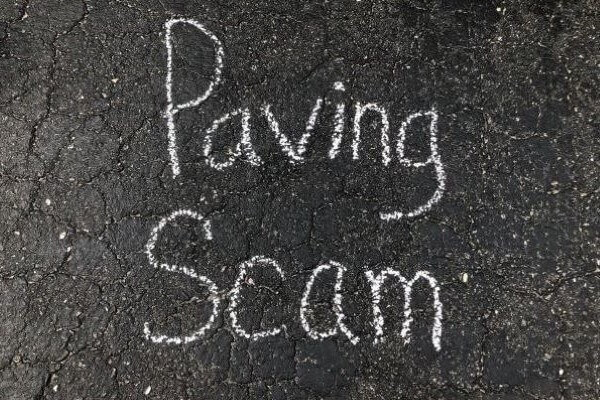Maine Attorney General warns of paving scams
 |
|
SBN STAFF/Liz Gotthelf
|
As the weather warms, the Office of the Maine Attorney General warns consumers to watch out for paving scams. The Office of the Attorney General has received many reports about too-good-to-be-true paving scams that end up costing consumers hundreds, or even thousands, of dollars.
How the scam works
A seller of paving services comes to a consumer’s door, claiming that they just finished a nearby paving job. They offer to pave the consumer’s driveway at a discounted rate using leftover asphalt. The paver then gives a low estimate—or no estimate at all—and begins paving the driveway without providing a contract. After the paver completes the paving job, they will demand a much larger payment than the original estimate. In some cases, the paver will have paved a larger-than-agreed upon area to justify the increased price. In other cases, the paver might use intimidation or threats to get consumers to agree to the increased price. After the paver leaves, the consumer often notices that the paving job is incomplete or shoddy. The consumer has now lost thousands of dollars and ended up with a bad paving job.
What consumers should look for
Not all paving scams will be the same. Here are some red flags a consumer should watch out for that indicate a scam:
• Unlicensed pavers: Maine law requires a door-to-door seller of home repair services to be licensed by the State and carry that license if he does not have a permanent place of business in the municipality where he is soliciting work. Ask whether the paver has a permanent place of business in your municipality. If the answer is no, ask to see the license. You can verify the license online at https://www.maine.gov/pfr/professionallicensing/professions/regulation-transient-sales/online-services
• A story about leftover asphalt from a nearby job: Reputable sellers of paving services will be careful to measure out the right amount of asphalt for a job and, due to the way hot asphalt is laid and compacted, leftover asphalt is usually not immediately useable.
• Too-good-to-be-true pricing: Be careful if an estimate for a job seems much lower than expected.
• Unclear estimate: Watch out for pavers who refuse to give a clear estimate or measure out the site in advance. They are trying to avoid giving a firm price so they can strong-arm you into paying a higher price after the job is complete.
• No contract: Make sure to sign a contract before the paver begins any work. Maine law requires door-to-door sellers of paving services to provide a written contract with specific provisions, including the seller’s name and address, the date, the terms of sale, a three-day notice period, signatures of the seller and the consumer, and a statement that work cannot be started until the three-day notice period has expired. A scammer will often refuse to give a contract before beginning work so you don’t know your rights and can’t prove the original estimate.
• Pavers who want to begin work immediately: Maine law requires sellers of door-to-door paving services to wait three days after solicitation to begin a paving job. This waiting period is to ensure that consumers avoid a high-pressure sales situation. If a paver wants to begin work right away, they may be trying to make sure you feel pressured to agree to the job.
• Asking for cash payments: Scammers often prefer cash payments so any money tied to their illegal transactions can’t be traced or recovered. Some scammers will accept a cash payment and then flee before beginning any work.
Scammed? What consumers can do
Know your rights: Consumers are protected from paving scams by the following laws: The Consumer Solicitation Sales Act, The Transient Sales Act, and The Door-to-Door Seller of Home Repair Services Act. The Maine Consumer Law Guide gives more information about how these laws protect Maine consumers from predatory pavers. https://www.maine.gov/ag/consumer/lawguidearticle.shtml?id=27932
Cancel your contract: If a door-to-door seller of paving services began the paving job within three days of the solicitation, you can cancel the contract even if the job has been completed. You must cancel in writing and send your written cancellation to the seller. Once you have cancelled within the three-day period, you are under no obligation to pay for any work, even work that was already done.
Contact law enforcement: Call your local police department. Then file a complaint online with the Office of the Attorney General’s Consumer Protection division at https://www.maine.gov/ag/consumer/complaints/index.shtml You can also call the Consumer Protection Division to file a complaint Monday through Thursday, from 9 a.m. to noon at 207-626-8849, or 800-436-2131.

